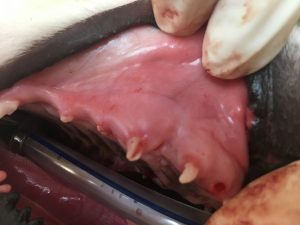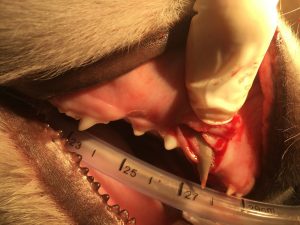Hi there, Dr. Kris here. I’d like to introduce you to my dog, Howie (Howard, for short). Contrary to popular belief, he is an English Setter, not a hairy Dalmatian. He’s around nine years old. His hobbies are sleeping. That’s it, just sleeping. On my bed. With his head on my pillow.
I often liken Howie to the proverbial cobbler’s children. Not only does he have no shoes, sometimes his veterinary care can be a bit lax. In my defense, he does not make it easy. He can sniff a pill in anything and will promptly turn tail and run. We’ve tried everything- peanut butter, canned food, cheese, cream cheese, meat- and even if something works the first time, he’ll figure it out the next time. The last time he needed medicine, my husband devised a three-tiered system of dog food wrapped in old salmon skin dipped in chicken fat with the pill in the middle. I’m scared of what the fourth tier will have to be!
The place where I’ve been most deficient is getting his heartworm pill in him each month. He won’t take it like a treat, he sniffs it out of cheese, and trying to pill him with it is a circus. Add to that, two children, a job, and a generally forgetful nature, I’m lucky if Howie gets his heartworm preventative half the time. I feel guilty (every time I miss a dose, I leave him unprotected against heartworms for a month), I feel embarrassed (you know what I do for a living, right?), but those things don’t make it any easier to get it in him.
Knowing how difficult it can be, I know Howie and I can’t be the only ones. For this reason, we decided to start carrying ProHeart6, an injectable heartworm preventative that lasts for six months. And let me tell you, Howie got his injection the first day!
I know many of you are SO GOOD about giving your dogs preventative every month, and my hat is off to you. Keep up the good work- ProHeart is not for you! We still strongly recommend the monthly preventatives, both oral and topical, over ProHeart because they also provide a monthly deworming against intestinal worms. Some intestinal worms are zoonotic which means they can be passed to humans, so that monthly deworming is a great thing for your dog, yourself, and your family.
However, if that is not you, the ProHeart injection is a great option. One injection of ProHeart will give your dog six months of protection against heartworms, and heartworms is a nasty disease! Heartworms can cause heart failure and even death when left untreated, and treatment for heartworms is costly, time-consuming, and can have potential complications. ProHeart does have some limited intestinal worm protection, but due to this limited coverage, it is important to continue bringing in a stool sample every six months to check for these intestinal worms.
So, ProHeart is not the right heartworm preventative for every family, but it’s a great option for those of us that, for whatever reason, have not been able to get heartworm preventatives in our dogs monthly. I feel so much better knowing Howie is covered. I won’t have to hold my breath as his heartworm test is running next year!
If you have any questions about ProHeart, please let us know. We’re excited to have more of our patients covered for heartworms!
For more information on heartworms:
https://veterinarypartner.vin.com/default.aspx?pid=19239&id=4951491
For more information on Roundworms:
https://veterinarypartner.vin.com/default.aspx?pid=19239&id=4951364
Hooks:
https://veterinarypartner.vin.com/default.aspx?pid=19239&id=4951969
Whips:
https://veterinarypartner.vin.com/default.aspx?pid=19239&id=4952061




Recent Comments